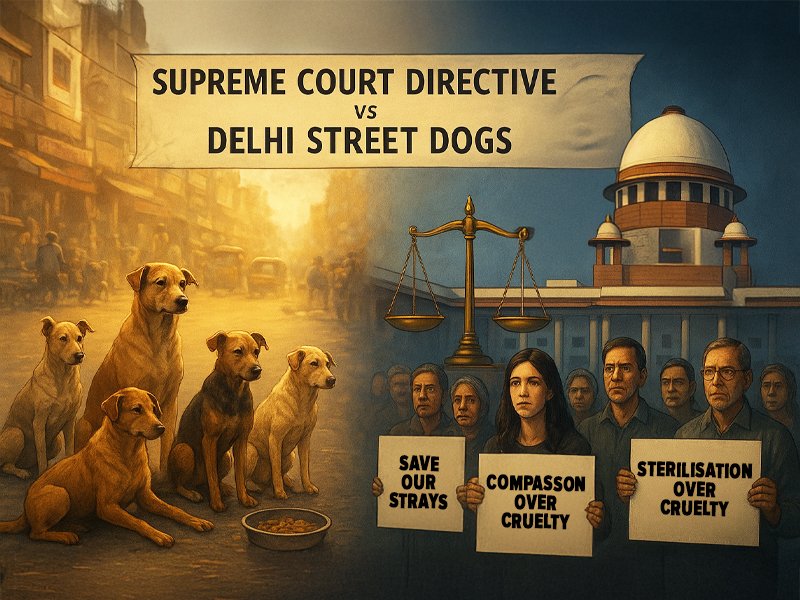
When nations buckle under crime, poverty and corruption, it's jarring for their highest court to pivot its gaze toward stray dogs. Yet that is precisely what India’s Supreme Court has done with its misplaced priority and hardline mandate: seize all stray dogs in Delhi-NCR and lock them into shelters, forever.
A Case That Should Never Have Been
The case began not with a public outcry, but a suo moto hearing, triggered by a news report of a dog attacking a child. It was only later revealed by the parents that their daughter had succumbed to meningitis, not the alleged attack.
Yet, in a city overwhelmed by unsafe roads and daily civic body failures, the Court decided that stray dogs, not criminals, deserved its top-priority intervention, thus inventing a crisis in vacuum.
The Court’s verdict was blunt and without compromise: all stray dogs in Delhi-NCR must be caught, sterilised, vaccinated and permanently kept in shelters. To make sure none escape, CCTV cameras are to be installed and municipal staff instructed to prevent their release.
The justification? Public safety and prevention of rabies. The reality? With over a million stray dogs in the capital region and no infrastructure to house them, the directive is logistically impossible and morally questionable.
The People Said No and They Meant It
The order sparked immediate outrage because Delhi’s citizens didn’t stay silent. Animal lovers, caregivers, rescuers and activists converged at India Gate with protest signs in hand ad voices that said: “Sterilise, don’t incarcerate.” Police booked protestors under pressure from the court’s order. Celebrities and animal welfare organisations condemned the decision as well.
Meanwhile, the real culprit in this tragedy is not the stray dog, it’s governmental failure. The Animal Birth Control (ABC) programme has sputtered with underfunding, neglect and poor implementation. India’s stray dog population is a staggering 52.5 million, yet only 8 million are ever sheltered.
Delhi MCD remains clueless. They’ve let 77 makeshift “dog clinics” sit idle for 20 years and failed to meet even basic sterilisation targets year after year. The Court’s fantasy—3,000 shelters with drainage, water, kitchens and staff—would cost around ₹15,000 crore plus ₹5 crore weekly to feed the animals. The Court’s order may sound decisive on paper, but on the ground, it is simply impossible.
Maneka Gandhi: A Voice of Reason
Among the most vocal critics of the ruling is Maneka Gandhi, former Union Minister and one of India’s most respected animal welfare advocates. She called the order “impractical, financially unviable and ecologically dangerous.” She pointed out that just a month before this, another bench of the Supreme Court had delivered a balanced ruling in favour of ABC rules, designated feeding spots and sterilisation.
In sharp detail, she laid out why the order is not just impractical but reckless:
• Vacuum effect: Remove Delhi’s dogs and within 48 hours, more dogs will flood in from neighbouring states.
• Ecological consequences: Dogs are Delhi’s rodent control. Remove them, and rats and monkeys will overrun streets.
• Massive human costs: 3,000 shelters would require remote lands, ₹15,000 crore to build, crores more to manage and 1.5 lakh staffers for sanitation.
• Distrust of shelter efficacy: Many dogs in shelters fall ill, retreat psychologically or die from infection.
Public Opinion and Common Sense
The Supreme Court’s order doesn’t just criminalise street dogs but also compassion. It ignores decades of scientific evidence showing that mass removal does not solve the problem; it only moves it elsewhere.
Delhi’s streets don’t lack solutions, they lack will. Stray dogs are not just animals but a part of the city’s living fabric. They guard our streets, wag at strangers and remind us that kindness is free. To confine them is to strip the city of a piece of its soul.
The real solution lies in doing what the government has long avoided, proper implementation of the ABC programme and public education on co-existence.
Netherlands eliminated its stray dog problem entirely without mass killing or incarceration, using nothing but consistent sterilisation, registration and community involvement. Delhi deserves the same humane, intelligent solution—not a knee-jerk order that will waste public money, overcrowd shelters and condemn healthy animals to lifetimes of confinement.